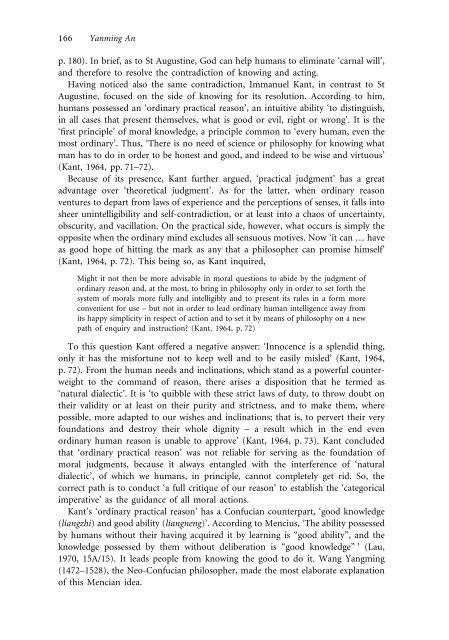Western sincerity and Confucian Cheng
You also want an ePaper? Increase the reach of your titles
YUMPU automatically turns print PDFs into web optimized ePapers that Google loves.
166 Yanming An<br />
p. 180). In brief, as to St Augustine, God can help humans to eliminate ‘carnal will’,<br />
<strong>and</strong> therefore to resolve the contradiction of knowing <strong>and</strong> acting.<br />
Having noticed also the same contradiction, Immanuel Kant, in contrast to St<br />
Augustine, focused on the side of knowing for its resolution. According to him,<br />
humans possessed an ‘ordinary practical reason’, an intuitive ability ‘to distinguish,<br />
in all cases that present themselves, what is good or evil, right or wrong’. It is the<br />
‘first principle’ of moral knowledge, a principle common to ‘every human, even the<br />
most ordinary’. Thus, ‘There is no need of science or philosophy for knowing what<br />
man has to do in order to be honest <strong>and</strong> good, <strong>and</strong> indeed to be wise <strong>and</strong> virtuous’<br />
(Kant, 1964, pp. 71–72).<br />
Because of its presence, Kant further argued, ‘practical judgment’ has a great<br />
advantage over ‘theoretical judgment’. As for the latter, when ordinary reason<br />
ventures to depart from laws of experience <strong>and</strong> the perceptions of senses, it falls into<br />
sheer unintelligibility <strong>and</strong> self-contradiction, or at least into a chaos of uncertainty,<br />
obscurity, <strong>and</strong> vacillation. On the practical side, however, what occurs is simply the<br />
opposite when the ordinary mind excludes all sensuous motives. Now ‘it can … have<br />
as good hope of hitting the mark as any that a philosopher can promise himself’<br />
(Kant, 1964, p. 72). This being so, as Kant inquired,<br />
Might it not then be more advisable in moral questions to abide by the judgment of<br />
ordinary reason <strong>and</strong>, at the most, to bring in philosophy only in order to set forth the<br />
system of morals more fully <strong>and</strong> intelligibly <strong>and</strong> to present its rules in a form more<br />
convenient for use – but not in order to lead ordinary human intelligence away from<br />
its happy simplicity in respect of action <strong>and</strong> to set it by means of philosophy on a new<br />
path of enquiry <strong>and</strong> instruction? (Kant, 1964, p. 72)<br />
To this question Kant offered a negative answer: ‘Innocence is a splendid thing,<br />
only it has the misfortune not to keep well <strong>and</strong> to be easily misled’ (Kant, 1964,<br />
p. 72). From the human needs <strong>and</strong> inclinations, which st<strong>and</strong> as a powerful counterweight<br />
to the comm<strong>and</strong> of reason, there arises a disposition that he termed as<br />
‘natural dialectic’. It is ‘to quibble with these strict laws of duty, to throw doubt on<br />
their validity or at least on their purity <strong>and</strong> strictness, <strong>and</strong> to make them, where<br />
possible, more adapted to our wishes <strong>and</strong> inclinations; that is, to pervert their very<br />
foundations <strong>and</strong> destroy their whole dignity – a result which in the end even<br />
ordinary human reason is unable to approve’ (Kant, 1964, p. 73). Kant concluded<br />
that ‘ordinary practical reason’ was not reliable for serving as the foundation of<br />
moral judgments, because it always entangled with the interference of ‘natural<br />
dialectic’, of which we humans, in principle, cannot completely get rid. So, the<br />
correct path is to conduct ‘a full critique of our reason’ to establish the ‘categorical<br />
imperative’ as the guidance of all moral actions.<br />
Kant’s ‘ordinary practical reason’ has a <strong>Confucian</strong> counterpart, ‘good knowledge<br />
(liangzhi) <strong>and</strong> good ability (liangneng)’. According to Mencius, ‘The ability possessed<br />
by humans without their having acquired it by learning is “good ability”, <strong>and</strong> the<br />
knowledge possessed by them without deliberation is “good knowledge” ’ (Lau,<br />
1970, 15A/15). It leads people from knowing the good to do it. Wang Yangming<br />
(1472–1528), the Neo-<strong>Confucian</strong> philosopher, made the most elaborate explanation<br />
of this Mencian idea.


